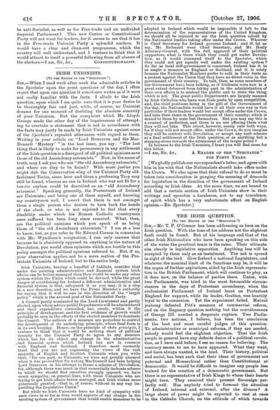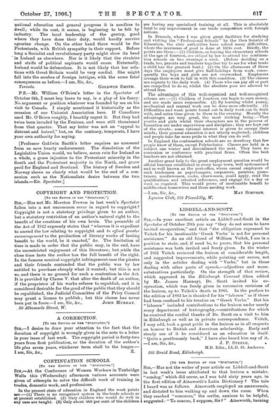THE IRISH QUESTION.
[To THE EDITOR OF THE " SPECTATOR."1
SIR,—Mr. T. P. O'Connor has been addressing us here on the Irish question. With the tone of his address not the slightest fault could be found. But of his language and that of the other Irish Nationalists who have been speaking on this side of the water the practical tenor is the same. Their ultimate aim clearly is legislative separation. Anything less will be accepted by them only as an instalment. The net is spread in sight of the bird. Give Ireland a national Legislature, and whatever the nominal limit of its functions may be, it will be the organ of further aspirations, aided by the Irish representa- tion in the British Parliament, which will continue to play, as it does now, on the balance of parties there. Union, with two Parliaments, was tried in the most favourable circum- stances in the days of Protestant ascendency, when the exclusionist Parliament of Ireland leant on Protestant England for support, while its leader, Grattan, was heartily loyal to the connexion. Yet the experiment failed. Mutual jealousy defeated Pitt's measure of commercial reform, and on the Regency question nothing but the convalescence of George III. averted a desperate rupture. Two Parlia- ments, two nations, I believe, has been the conclusion of the best and most careful judges of this question. To administrative or municipal reforms, if they are needed, nobody would feel the slightest objection. That the Irish people in general have any definite desire of a political revolu- tion, as I have said before, I see no reason for believing. The contrary seems to me to have appeared. What they want, and have always wanted, is the land. Their history, political and social, has been such that their ideas of government are paternal and Monarchical rather than Constitutional or democratic. It would be difficult to imagine any people less trained for the creation of a democratic government. But there is no representative of Irish Sings to whom their hearts might turn. They received their present Sovereign per- fectly well. Has anybody tried to forecast the situation of Ireland, internal and external, after the divorce ? A large share of power might be expected to vest at once in the Catholic Church, on the attitude of which towards national education and general progress it is needless to .dwell; while its cost, it seems, is beginning to be felt by industry. The local leadership of the gentry, good where they have done their duty, would hardly survive agrarian change. On the other hand there would' be the Protestants, with British sympathy in their support. Before long a Socialist and revolutionary party might show its bead in Ireland as elsewhere. Nor is it likely that the rivalries and strife of political aspirants would cease. Externally, Ireland would be defenceless. It is not likely that her rela- tions with Great Britain would be very cordial. She might fall into the meshes of foreign intrigue, with the same fatal consequences as before.—I am, Sir, &c., P.S.—Mr. William O'Brien's letter in the Spectator of October 6th, I must beg leave to say, is a play of his fancy. No argument or position whatever was founded by me on his visit to Canada. I simply mentioned it historically as the occasion of our Unionist Association here. If Canadians used Mr. O'Brien roughly, I heartily regret it. But they had twice been invaded by the Fenians, and were still threatened from that quarter. That my letter was not an "appeal to distrust and hatred," but, on the contrary, temperate, I have your own authority for saying.
[Professor Goldwin Smith's letter requires no comment from us save hearty endorsement. The dissolution of the Legislative Union would, we believe, mean ruin for Ireland as a whole, a gross injustice to the Protestant minority in the South and the Protestant majority in the North, and grave peril for England and Scotland. The history of Sweden and Norway shows us clearly what would be the end of a con- nexion such as the Nationalists desire between the two islands.—En. Spectator.]















































 Previous page
Previous page